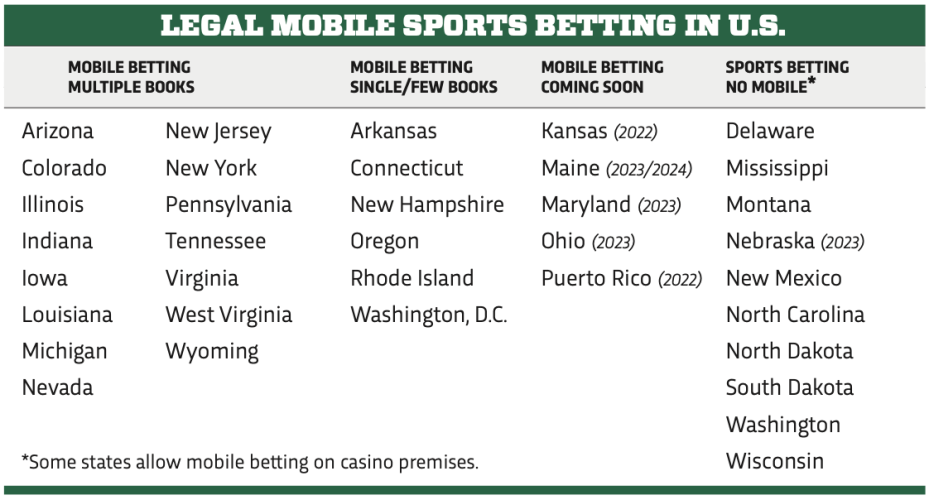The landscape for sports betting has changed dramatically since the Supreme Court overturned a law in 2018 (the Professional and Amateur Sports Protection Act, or PASPA for short) that essentially limited sports wagering to Nevada. Since then, 35 states along with Washington, D.C., and Puerto Rico have enabled legal sports betting, with several more on the brink. Of course, sports betting was already happening in all these jurisdictions through illegal offshore sportsbooks and local bookies.
Moving to legal sports betting allows states to ensure consumer protection measures (such as making sure winnings are paid), force sportsbooks to offer help to problem gamblers and collect tax revenue.
However, just 24 states (plus Washington, D.C., and Puerto Rico) have legalized mobile sports betting. That's important because mobile (or online) sports betting is how most people place bets. More than 90 percent of sports bets are made online in mature markets like New Jersey. The convenience of legal mobile sports betting is also the best way to combat the illegal market, which is easily accessible online.
Passing a state law to enable legal sports betting faces obstacles even beyond those who oppose it on moral grounds. Most states have existing gambling stakeholders (a state lottery, physical casinos, tribal gaming) who often view mobile sports betting unfavorably or fear it will open the state to online casino games (known as igaming) — even though studies by the Fantasy Sports & Gaming Association show that mobile sports wagering doesn't deter people from going to brick-and-mortar casinos (which are still growing in states with online sports betting).
Here's the status and outlook of each state that has legalized some form of mobile sports betting as of June 1:

[Editor's note: Massachusetts is now in the "Mobile Betting Coming Soon" category after a law was enacted in August.]
Legal Betting States with Multiple Online Sportsbooks
These are states that are legal and operating with multiple online sportsbooks.
- Arizona
- Colorado
- Illinois
- Indiana
- Iowa
- Louisiana
- Michigan
- Nevada
- New Jersey
- New York
- Pennsylvania
- Tennessee
- Virginia
- West Virginia
- Wyoming
Legal Betting States with Limited Online Sportsbooks
The following states offer online betting, but may only have one or two online sportsbooks depending on regulations.
- Arkansas
- Connecticut
- New Hampshire
- Oregon
- Rhode Island
- Washington D.C.
Upcoming Legal Betting States and Launch Dates
With more and more states going through betting legislation all the time, this list is growing ever-so quickly. Here is a list of the upcoming states with their projected launch dates.
- Kansas (fall 2022)
- Maine (late 2023 or 2024)
- Maryland (mid-2023)
- Ohio (Jan. 1, 2023)
- Puerto Rico (fall 2022)
- Massachusetts (mid-2023)
Retail or On-Premise Only Sports Betting States
These states are all legal in terms of offering sports betting, but they do not have mobile sports betting infrastructure, laws prohibiting mobile sports betting, or only offer on casino premises.
- Delaware
- Mississippi
- Montana
- Nebraska (2023 launch)
- New Mexico
- North Carolina (failed attempt to add mobile betting in 2022)
- North Dakota
- South Dakota
- Washington
- Wisconsin
Here's a look at states without legal sports betting:
Alaska
The Department of Revenue commissioned a study about the state adding betting and other forms of gambling in 2022, which could kick-start legislation in 2023.
Alabama
Bills to legalize mobile sports betting have been introduced the last two years but without much momentum.
California
The largest potential sports betting market in the country (estimated $30 billion in total bets at peak) could take a big step toward legal sports betting this fall. Two ballot initiatives will be before voters in November. The California Sports Wagering Regulation and Unlawful Gambling Act would allow for retail sports betting in tribal gaming casinos. The California Solutions to Homelessness and Mental Health Support Act would allow for only mobile bets, with tax revenue dedicated to homelessness. If either passes, lawsuits are likely as several tribes have said they plan to go all out to prevent mobile sports betting, and local card rooms would be left out of the retail market.
Florida
Mobile sports betting was briefly legal in Florida in late 2021 before a series of court cases shut it down amid a protracted legal battle. A law was passed in 2021 that gave the Seminole Tribe exclusive rights to retail and mobile sports betting. The Seminole Tribe then launched a mobile sports betting app under the Hard Rock brand, taking bets for a little more than a month. A Federal lawsuit charges that federal tribal gaming law only allows a bet on tribal lands and that a bet made through the internet on servers located on that land doesn't qualify. The case could have ramifications for tribal gaming elsewhere in the country. The court case might not get resolved until well into 2024, and a judge shut down all sports betting in the meantime. A ballot measure that would have legalized mobile sports betting for multiple providers failed to get enough signatures to qualify for the 2022 election.
Georgia
Bills to legalize mobile sports betting have been introduced but failed to pass each of the last three years. Sports betting may also need a state constitutional amendment, which could mean an additional step of passing a voter referendum.
Idaho
There's been no movement to legalize sports betting in the state and that doesn't look to change in the near future.
Kentucky
A bill to legalize mobile sports betting passed the house in 2022 but failed to pass the senate. Still, momentum is building that the state could pass mobile sports betting in 2023.
Massachusetts
The house and senate passed mobile sports betting bills this spring, giving hope the two chambers could find a compromise and send a bill to the governor this fall. [Editor's note: the state passed a sports betting law in August that enables retail and mobile sports betting. Regulations need to be written, with an estimated launch date some time in 2023, likely before NFL season starts.]
Minnesota
A bipartisan bill to legalize mobile sports betting that aligned with tribal gaming passed the house in 2022 but failed to pass the senate, where leaders also wanted to include sports betting at horse racing tracks. A compromise is possible in 2023.
Missouri
A bill to legalize mobile sports betting passed the house in 2022 but failed to pass the senate. It was the fifth consecutive session that sports betting legislation was introduced, and it failed to pass mostly because of the inclusion of other gaming issues such as the legality of video lottery terminals (VLTs), about which there is disagreement among existing gambling stakeholders. It was the farthest a bill has advanced, so there is optimism in 2023 that the VLT issue can be settled or sidestepped.
Oklahoma
An attempt to legalize retail sports betting through renegotiated tribal gaming compacts failed in a court battle in 2020. A bill was introduced to allow retail sports betting in 2022 but didn't get a vote. The state has the second-most casinos in the country after Nevada, so adding mobile sports betting to the equation likely will be difficult.
South Carolina
A bill was introduced to legalize mobile sports betting in 2022 without much progress. However, the issue could gain momentum in 2023, especially if North Carolina adds mobile sports betting to its retail operations (a bill in North Carolina is up for debate this fall).
Texas
The Lone Star state has been resistant to adding most forms of legal gambling, and sports betting has faced an uphill battle. A bill was introduced in 2021 to legalize mobile sports betting but did not get a vote. There is optimism for 2023 because almost all the local professional sports teams and sports businesses have advocated for legal sports betting.
Hawaii & Utah
Hawaii and Utah are the only states without any forms of legal gambling, so the outlook for mobile sports betting is poor. However, a bill was introduced in Hawaii in the last legislative session that went nowhere but could eventually build momentum.
Do you want to have legal sports betting in your state? If so, the best way to make an impact is by contacting your state representative or senator. You can find your state legislators by going to http://www.fansforthefuture.com.
One thing I've learned in lobbying state legislatures for fantasy sports, DFS and sports gambling is that contacting your state representatives really can make a difference. I can't tell you how many times I've been in a meeting with legislators lobbying for a bill and they remarked on how much public input they had received. Thinking that meant hundreds of emails or phone calls, I was surprised to learn it was only a handful of contacts. To them, that was a big deal. On issues like this, contacting your state legislators really makes a difference. In states without sports betting, reach out to your legislator. You'll be shocked how much of a difference it can make.
Schoenke is a co-founder and head of RotoWire. He's also on the board of directors of the Fantasy Sports & Gaming Association where he served as chairman for more than a decade and leads the organization's government affairs efforts. He's testified in a dozen state legislatures about fantasy sports and sports betting legislation and defended the daily fantasy sports industry in a hearing before Congress in 2016.


























